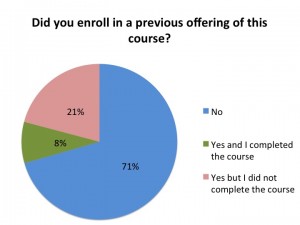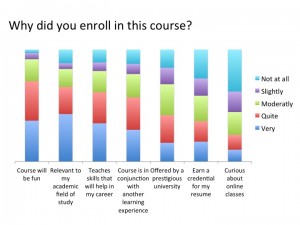The results from the pre-course survey for the second run of Duke’s Medical Neuroscience MOOC are in! Of the over 5000 students who completed the survey, 8% previously completed the first session in Spring 2013. This means that, if the survey is representative of enrollments, over 2,200 people who completed the first session found it so beneficial that they have returned to learn even more!
Other students (21 %) attempted the first session of the course but did not complete it. In the post-course survey from the first session, several students indicated that they had not completed that session but planned to return. For example, one student wrote,
Excellent course, one of the best MOOC’s I have taken so far, I really regret I haven’t had enough time to take it through, so I’m looking forward to the new iteration.
The survey also reveals that significantly more students now begin Medical Neuroscience with previous experience in an online class compared to one year ago. The chart below (click to enlarge) shows the percent of students in the current and prior sessions of Medical Neuroscience who have experienced different online learning platforms, and those for whom this course is their first time learning online.
As shown, in 2013 33% of students had never taken an online course before. One year later, this had dropped to 23%. Conversely, in 2013 just under half of the students had taken a Coursera course before. By 2014, this had grown to 63%. This reflects the extremely rapid rise in enrollment in online learning opportunities, particularly Coursera courses.
The last fact we want to highlight is that students in Medical Neuroscience enroll both because they want a challenging academic course, but also because they genuinely find it enjoyable to study the material. The chart below (click to enlarge) shows reasons students gave when asked why they enrolled in the course.
The dark blue and red bands at the bottom represent things that students felt were “very” or “quite” important. As we would expect in a highly rigorous course such as Medical Neuroscience, the fact that it is relevant to a student’s academic field of study was important to most (66%) of the students. However, in this case a difficult subject matter does not mean a boring class. The majority (71%) of students cited “the course will be fun” as an important reason they enrolled in the class.
Finally, we love how diverse our student body is in this course! In their own words, here is how some of the students describe their backgrounds:
I am a biology graduate student exploring research on how cytokines affect neuron function.
I am an executive coach and trainer, and previously spent 20+ years in various levels of management.
I am taking this course to gain a better understand the mechanics of pain and especially migraine headache as I and my mother both suffer with them way too often.
I am a consulting neuropsychologist and also teach, among other topics, brain and behavior courses.
I’m applying to medical school in the fall.
I am an administrative judge in the US doing cases involving a lot of health law.
I am a mathematician and an economist.
I’m currently in high school and taking college-level Chemistry and AP Psychology.
As you might guess from such a diverse group, students range in age from under 13 to over 65. Five percent of the students are pre-college, while 8% hold a doctorate degree. This diversity has led to a very active discussion forum with over 3,000 posts and comments in the first 4 weeks.
Once the course ends, we’ll post another update about how things went. Early indications are that student engagement is high and the students respond especially well to Dr. White. The following posting to the discussion board is representative of a sentiment shared by many students,
I believe this is one of the best courses not only in Coursera, but also every university offering the same field, [based on] the way our instructor is helping us so far.
Thank you to Sulochana Naidoo, Online Course Associate, and Andrea Novicki, Academic Technology Consultant, for feedback and assistance with this post.




Thank you for sharing this post. It is so encouraging to see that I am not alone in all the good I have gained from Coursera courses in general, and the introduction to neuroscience course in particular. Truly we all are grateful for the efforts that are required to arrange the availability of this important material. Thank you!
Thank you so much to the lectuters,Saluchana Naido and online course Andrea,academic.This is really a good and educative programme the lessons are intriguing,i like the way you conduct.I’am here to contribute and learn more.
Béatrice kalmanshi
I am enjoying this course in Neuroscience and plan on completing it. This is the send course I an taking given by Coursera and am simultaneously working on another course, Roman Architecture. I thank Coursera sincerely for their work in propagating knowledge. It is priceless commodity.
Thank you all for sharing your experiences with this course. We’re very excited to be able to offer it and look forward to hearing back from you at the end to let us know how it went!
Thank you Dr. White and your staff for putting together such a great course. And thank you for allowing us to your home and backyard. Have enjoyed the sound of birds, rain drops and the glowing fire, while learning the working of our amazing brain.
This is a great course! I am a former medical student from about 15 years ago. (Life happened and I couldn’t finish.)This course has given me the confidence that I still have the intellect and drive to study in the medical sciences. It’s very cool to see how much more information is known than it was when I took this class in med school. The teaching is top-notch and practical. I would recommend this course to anyone interested in neuroscience, medicine and psychology!
I am enjoying to attend this course. Although i am a medical graduate but i found it difficult to learn in each unit which is too much overload and should be reduced the contents in future course.
I’m a medical student, from Perú. This is a great experience, thank you so much for offering it, I’m guessing it takes a lot of work to organize all of this. I think Dr. White is, so far, the best teacher I’ve met, I’ve always loved neuroscience, but now, thanks to him, I’m loving it much more.
This course is the most difficult, challenging and enjoyable course I have ever taken.
Prof. White is the best teacher ever (I’m 61 and teacher of another subject myself) He will be my north star from now on wards so that my students benefit more. He makes my dendritic spines pop up like pop corn!
Dr. White has made the material understandable — That takes a lot of work, desire and knowledge. And he seems like a nice fellow. I don’t learn much without both.
I agree with Iris above — Professor White has inspired me to try to be a better person.
Many thanks.
This is not for the faint of heart. That being said Dr. White’s teaching ability is excellent. He makes the material understandable for a very complicated subject. The time commitment is high. I haven’t been to school since the 80’s and even longer since bio. and chem. but I am managing an A so far, even though some lectures I have had to view more than once. I appreciate the fact that Coursera and Duke have allowed this opportunity. Secretly, I always wanted to study this and I love that I found this opportunity. I am also a little squeamish so it’s great that I do not have dissect, etc.!
I´m a retired GP, living in the North of Germany. I worked out my doctor degree about 42 years ago on basic neuroscience (membrane features of nerve cells of Aplysia californica at the Max Planck Institut of Brain resurch in Frankfurt am Main). Now attending this amazing course, it´s a fascination for me to learn about so many news discovered about the function of our nervious system. And for all the very comprehensive way, this course is tought, using all the very instructive features of the media, causes a lot of fun and joy.
Many thanks to Dr. Leonard White and his collegues for these amazing lectures.
I love Dr White’s teaching style so much and he is the excellent teacher.I have learnt not only the knowledge but also the teaching style and his preparation .I also thank cousera really that cousera and Duke have allowed me getting this opportunity.
Dr White’s teaching styl super ex technical support super.To then creates what is presented to prezenšn. I am a special education teacher studying neuropsychology, this course is for me that balzám. Thank
This is my first Coursera course, and I am extremely impressed. I minored in neuroscience during my undergraduate studies, and am now a certified registered nurse anesthetist working on my doctoral degree. I am only watching the videos, not completing the exams, but I am grateful to be able to continue to learn without having to add to my mountains of student loans. I took the course because of my interest in neuroscience, but I also am interested in learning more about technology in higher education and I cannot think of a better example to exemplify its potential. Keep up the great work!